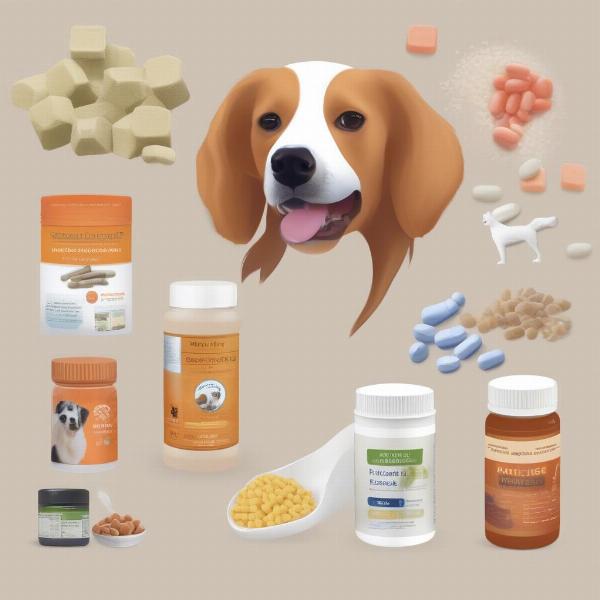Probiotics are live microorganisms that, when administered in adequate amounts, confer a health benefit on the host. This means they can help improve your dog’s gut health, which plays a crucial role in their overall well-being. Finding the best natural probiotics for dogs can be tricky with so many options available. This article will discuss the benefits of probiotics, different types, and how to choose the right one for your furry friend.
Understanding the Benefits of Probiotics for Dogs
A healthy gut is essential for a dog’s strong immune system, efficient digestion, and even mental health. Probiotics help maintain this balance by populating the gut with beneficial bacteria. They can be particularly helpful during times of stress, antibiotic use, or digestive upset. Some benefits include improved digestion, reduced gas and bloating, enhanced nutrient absorption, stronger immune response, and even healthier skin and coat. Are you noticing changes in your dog’s stool or behavior? Probiotics might be just what they need.
Different Types of Natural Probiotics for Dogs
There are various types of probiotics, each containing different strains of beneficial bacteria. Some common strains include Lactobacillus, Bifidobacterium, and Enterococcus. These probiotics come in various forms, such as powders, chews, capsules, and even incorporated into certain dog foods. Choosing the right type depends on your dog’s individual needs and preferences. Powders are easy to mix into food, while chews are a tasty treat. Capsules might be preferable for picky eaters.
Choosing the Right Probiotic for Your Dog
When selecting a probiotic, look for products specifically formulated for dogs, with clear labeling of the strains and CFUs (colony-forming units). The higher the CFU count, the more potent the probiotic. Consider your dog’s specific needs. Are they prone to allergies? Do they have sensitive stomachs? Consulting your veterinarian can help you choose the best natural probiotic for your dog’s unique situation. They can recommend specific strains and dosages.
 Different Types of Dog Probiotics
Different Types of Dog Probiotics
Integrating Probiotics into Your Dog’s Diet
Start with a small dose and gradually increase it as needed. Observe your dog for any adverse reactions, although these are rare with quality probiotics. Some probiotics can be given daily, while others are best used for specific situations like antibiotic treatment or digestive upset. Remember, consistency is key when it comes to seeing the benefits of probiotics.
Are Human Probiotics Safe for Dogs?
While some strains of bacteria are beneficial for both humans and dogs, it’s crucial to use probiotics specifically formulated for dogs. Human probiotics might contain different strains or dosages that are not appropriate for canine consumption. Always consult with your veterinarian before giving your dog any supplements intended for humans.
Signs Your Dog Might Benefit from Probiotics
If your dog experiences frequent digestive issues, such as diarrhea, gas, or vomiting, probiotics could help restore gut balance. Changes in appetite, skin problems, or a weakened immune system can also indicate a need for probiotic support. Always consult with your veterinarian to rule out any underlying health conditions.
Conclusion
Choosing the best natural probiotics for dogs involves understanding their benefits, different types, and how to choose the right one for your dog’s individual needs. By supporting your dog’s gut health with probiotics, you can contribute to their overall well-being and help them live a healthier, happier life. Remember to consult your veterinarian for personalized recommendations.
FAQ
- What are the benefits of probiotics for dogs? Probiotics can improve digestion, reduce gas and bloating, enhance nutrient absorption, boost the immune system, and improve skin and coat health.
- How do I choose the right probiotic for my dog? Look for products specifically formulated for dogs, with clear labeling of strains and CFUs. Consult your veterinarian for personalized recommendations.
- Can I give my dog human probiotics? No, always use probiotics specifically formulated for dogs. Human probiotics may contain inappropriate strains or dosages.
- How do I give my dog probiotics? Probiotics come in various forms, such as powders, chews, and capsules. Follow the product instructions and start with a small dose.
- When should I give my dog probiotics? Probiotics can be given daily or for specific situations like antibiotic treatment or digestive upset.
- Are there any side effects of probiotics for dogs? Side effects are rare but can include mild digestive upset.
- How long does it take to see results from probiotics? Results can vary, but you may notice improvements within a few weeks of consistent use.
ILM Dog is your trusted source for expert advice on all things dog-related. We cover everything from breed selection and health care to training, nutrition, grooming, and more. If you’re looking for reliable and practical information to help you provide the best care for your canine companion, explore our website for valuable resources and guidance. Contact us at [email protected] or +44 20-3965-8624 for personalized support. ILM Dog is dedicated to helping you navigate the world of dog ownership with confidence.